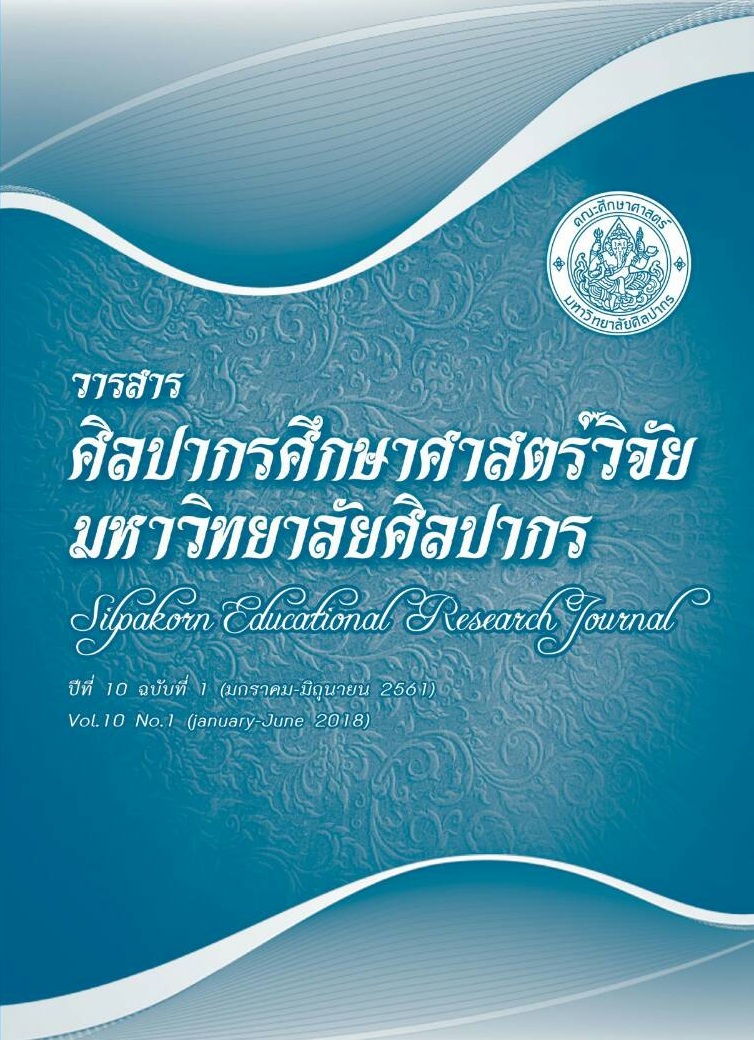การพัฒนาแบบจำลอง NPU Model : เพื่อส่งเสริมการพัฒนาหลักสูตรและนวัตกรรมการจัดการเรียนรู้ (The Development of NPU Model : For Encourages Development of Curriculum and Learning Management Innovation)
คำสำคัญ:
Curriculum Development Modelบทคัดย่อ
บทคัดย่อ
การพัฒนาแบบจำลอง NPU Model เป็นการวิจัยและพัฒนามีขั้นตอนการวิจัย แบ่งออกเป็น 4 ขั้นตอน คือ 1) การวิเคราะห์ 2) การออกแบบและพัฒนา 3) การนำไปใช้ และ 4) การประเมิน ประชากร เป็น นักศึกษาระดับปริญญาตรี ชั้นปีที่ 2 คณะครุศาสตร์ มหาวิทยาลัยนครพนม ภาคเรียนที่ 1 ปีการศึกษา 2559 จำนวน 6 วิชาเอก กลุ่มตัวอย่าง คือนักศึกษาวิชาชีพครู ระดับปริญญาตรี วิชาเอกวิทยาศาสตร์ จำนวน 25 คน ได้มาจากการสุ่มตัวอย่างแบบแบ่งกลุ่ม เครื่องมือที่ใช้ในการวิจัย ประกอบด้วย 1. แบบทดสอบวัดความรู้วิชาการพัฒนาหลักสูตร 2. แบบประเมินความสามารถในการปฏิบัติงานพัฒนาหลักสูตร 3. แบบสอบถามความคิดเห็นของนักศึกษาที่มีต่อแบบจำลอง NPU Model การวิเคราะห์ข้อมูลด้วยสถิติ ค่าเฉลี่ย ค่าส่วนเบี่ยงเบนมาตรฐาน ค่าเฉลี่ยร้อยละการทดสอบค่าที (t-test) แบบ Dependent และการวิเคราะห์เนื้อหา (Contest Analysis)
ผลการวิจัย พบว่า
1. การพัฒนาแบบจำลอง NPU Model ผลการพัฒนาได้แบบจำลอง NPU Model ประกอบด้วย 4 ขั้นตอนคือ 1) การวางแผนหลักสูตร 2) การออกแบบหลักสูตร 3) การจัดหลักสูตร และ 4. การประเมินหลักสูตร ในการนำแบบจำลอง NPU Model ไปใช้สอนอาศัยแนวคิดการสร้างองค์ความรู้ด้วยตนเอง โดยประสิทธิภาพของกระบวนการ ได้คะแนนเฉลี่ยร้อยละ (E1) 81.10 และประสิทธิภาพของผลผลิต ได้คะแนนเฉลี่ยร้อยละ (E2) 81.00
2. การเปรียบเทียบความรู้ของนักศึกษาก่อนและหลังการเรียนรู้ตามแบบจำลอง NPU Model มีความแตกต่างอย่างมีนัยสำคัญทางสถิติที่ระดับ .01
3. ความสามารถในการพัฒนาหลักสูตรของนักศึกษาโดยรวม อยู่ในระดับดีมาก
4. ความคิดเห็นต่อแบบจำลอง NPU Model นักศึกษาเห็นด้วยในระดับมากทุกข้อ
คำสำคัญ : แบบจำลองการพัฒนาหลักสูตร
* ผู้ช่วยศาสตราจารย์ ดร. สาขาวิชาหลักสูตรและนวัตกรรมการจัดการเรียนรู้ คณะครุศาสตร์ มหาวิทยาลัยนครพนม
Abstract
The development of NPU Model was research and development method which consists of 4 steps were 1) analyzing, 2) designing and developing, 3) trial, and 4) evaluation. The research population comprised second-year students from six different majors at the Faculty of Education, Nakhon Phanom University, during the second semester of the 2016 academic year. The sample group consisted of 25 Science-major students who were selected using cluster random sampling. Research tools used in this study were: 1) a curriculum development knowledge test, 2) an evaluation test on the capability of the performance in curriculum development, and
3) a questionnaire to investigate students’ opinions towards NPU model curriculum development learning approaches, Analyzed data by statistics; percentages, standard deviation, mean, dependent t-test, and content analysis.
The results of this research are as follows:
1. The development of NPU model, the results shows that the model were comprising four steps: 1) planning, 2) designing, 3) organization, and 4) evaluation. The researcher used the Constructivist Learning Model or CLM as guidelines, The result of the ability in curriculum engineering was at (E1) 81.10 and the knowledge gained was at (E2) 81.00.
2. The differences in students’ learning outcomes or students’ knowledge before and after being taught by NPU model were statistically significant at the .01 level. The students’ learning outcome after instruction proved higher than before.
3. The ability of the students in project work as a whole was at a high level. Looking at each aspect separately, the students’ ability also ranked at a high level in the following order: planning, work and presentation, and work processing.
4. The students’ opinions towards NPU model as a whole were at a high level of agreement.





